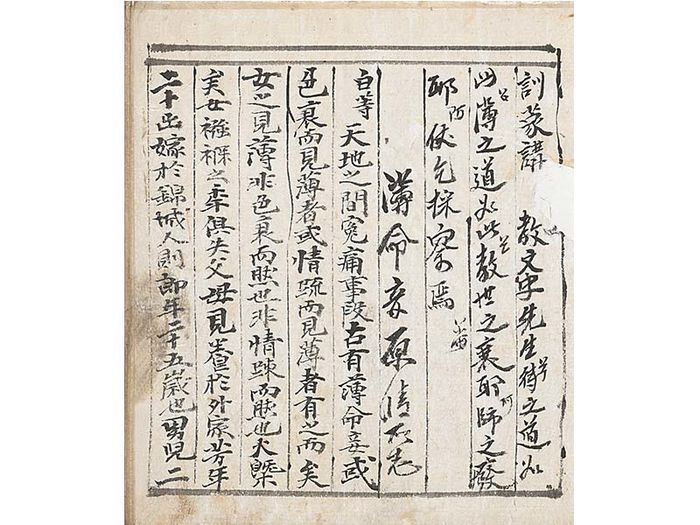"(Translation) 薄命妾原情所志"의 두 판 사이의 차이
Jaeyoon.song (토론 | 기여) (→Original Script) |
(→Student 1 : (Write your name)) |
||
| 149번째 줄: | 149번째 줄: | ||
| − | ==='''Student 1 : ( | + | ==='''Student 1 : (Irina)'''=== |
---- | ---- | ||
*Discussion Questions: | *Discussion Questions: | ||
| − | + | Well-known are the duties of man and woman in their family (rituals, responsibilities to other family members etc). According to Choseon's legal code, has been harmonious sexual life treated as part of a harmonious family? | |
==='''Student 2 : (Kim Young)'''=== | ==='''Student 2 : (Kim Young)'''=== | ||
2017년 7월 18일 (화) 14:13 판
| Primary Source | ||
|---|---|---|
 |
Title | |
| English | A petition to the magistrate by a mistreated lady | |
| Chinese | 薄命妾原情所志 | |
| Korean(RR) | 박명첩원청소지 | |
| Text Details | ||
| Genre | Old Documents (文書) | |
| Type | ||
| Author(s) | ||
| Year | ||
| Source | ||
| Key Concepts | ||
| Translation Info | ||
| Translator(s) | Participants of 2017 Summer Hanmun Workshop (Advanced Translation Group) | |
| Editor(s) | ||
| Year | 2017 | |
목차
- 1 Introduction
- 2 Original Script
- 3 Discussion Questions
- 4 Further Readings
- 5 References
- 6 Translation
- 6.1 Student 1 : (Irina)
- 6.2 Student 2 : (Kim Young)
- 6.3 Student 3 : (Write your name)
- 6.4 Student 4 : (Jong Woo Park)
- 6.5 Student 5 : (Write your name)
- 6.6 Student 6 : (Write your name)
- 6.7 Student 7 : King Kwong Wong
- 6.8 Student 8 : (Write your name)
- 6.9 Student 9 : (Write your name)
- 6.10 Student 10 : (Write your name)
- 6.11 Student 11 : (Write your name)
- 6.12 Student 12 : (Write your name)
- 6.13 Student 13 : (Write your name)
- 6.14 Student 14 : (Write your name)
- 7 Further Readings
Introduction
From 平民 民願文書 規式集
Original Script
| Classical Chinese | English |
|---|---|
|
1. 薄命妾 原情 所志 白等 天地之間 寃痛事段 古有薄命妾 或色衰而見薄者 或情疎而見薄者有之 2. 而矣女之見薄 非色衰而然也 非情疎而然也 大槩矣女襁褓之秊 俱失父母 見養於外家 芳年二十出嫁於錦城人 則郞年二十五歲也 男兒二十五歲 孰無陰陽之心 3. 自相逢夜 今至六七之間 不見一番衾裡之樂 以靑春之心 不勝其情 每於深夜 觧裙就枕 手撫全身 强要合歡 則聽而不聞 4. 虛送長夜 苦待明朝 做其好容 巧其言笑 以挑其心 則視而不見爲臥乎所 今宵明宵 枕席流泉 房帷之中 便成楚越 夫婦之間 有若仇敵 琴瑟之樂 吾未見之也 關雎之興 吾未知之也 5. 身上新衣 自然而緩 頭邊黛髻猶是虛文乙仍于 痛哭歸來 方欲自決是如乎所 姑母唐突呈狀推尋設計爲乎所 所謂郎子 以外皃見之 則面目肌髥 太似人矣 而至於房事 有同僧流 具體未達 徒大無力 則猛虎之猶豫 不如蜂 蛘之螫 人皆曰 無用將軍 6. 將軍無用武之術 則<函關>萬無自闢之理是如乎 乘夜渡盧 深入不毛者 諸葛征伐立策 而髥婦良君 不知合變之術則已矣已矣 不去何俟 女子所仰望[放]良人者果何事耶 望其矣衣乎耶 望其食耶 非衣非食 7. 而所大望者 惟枕席上一事而矣 旣失耶望且無興 況則衣亦不足貴也 食亦不足貴也 8. 三生佳緣亦仍事 前生今生後生謂之三 而前後生猶不可信 而生於今之世 不見今之世樂 可憐此生 9. 生不如死是乎厼 且以天生之物理言之 則禽有䲶鴦 木有連理 雄飛從雌者 禽鳥之情也 連枝交柯 草木之情也 男兒情欲稟於陰陽 可以人不如禽鳥草木乎 10. 夫唱婦隨 夫婦之義也 女必從夫 男女之情也 而使有情之物 隨無益之夫 必不肯從 天性之固然 11. 一女抱怨 飛霜夜擊 內無怨女 文王之治 男女區區私情 仰訴於積善之下 無使靑春之女人虛老於無用將軍之家下 遂物理宜 千萬望良爲只爲 |
(translation) |
Discussion Questions
Further Readings
References
Translation
Student 1 : (Irina)
- Discussion Questions:
Well-known are the duties of man and woman in their family (rituals, responsibilities to other family members etc). According to Choseon's legal code, has been harmonious sexual life treated as part of a harmonious family?
Student 2 : (Kim Young)
- Discussion Questions:
1. Do you think this piece was written by a man or a woman? Who do think was the intended audience, men, women, or both? If this piece was written by a man, what can we make of the exaggerated description of female sexual desire?
2. Could sexual impotence really be a legitimate reason for divorce in the late-Joseon period?
3. In the writing, how does the speaker justify her sexual desire? How does she claim her sexual desire to be appropriate and natural, instead of licentious and degenerate?
Student 3 : (Write your name)
- Discussion Questions:
Student 4 : (Jong Woo Park)
- Discussion Questions:
How could they get married to each other?
What will happen if her husband do not agree upon divorce?
Student 5 : (Write your name)
- Discussion Questions:
Student 6 : (Write your name)
- Discussion Questions:
Student 7 : King Kwong Wong
- Discussion Questions:
- What does this document tell us about the sexuality of Chosŏn society? How does it differ from the traditional view?
- What is the purpose of this document? Considering its writing style, do you think that it was an actual legal petition or a literary satire of the period?
Student 8 : (Write your name)
- Discussion Questions:
Student 9 : (Write your name)
- Discussion Questions:
Student 10 : (Write your name)
- Discussion Questions:
Student 11 : (Write your name)
- Discussion Questions:
Student 12 : (Write your name)
- Discussion Questions:
Student 13 : (Write your name)
- Discussion Questions:
Student 14 : (Write your name)
- Discussion Questions:

